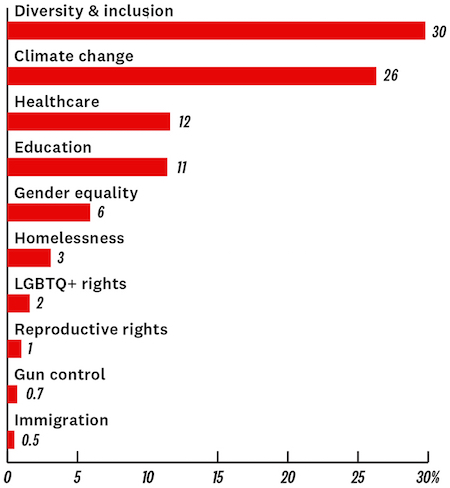People place high expectations on the private sector to take a lead in addressing the most pressing social, environmental and political issues facing the world today. Changing demographics, declining trust in government, the ubiquity of social media and a pervasive desire to see change across a spectrum of social and environmental issues has given birth to democratization of activism, and this has become one of the top challenges facing corporate brands today.
PR pros find themselves increasingly aware of activist culture’s growing influence, yet still often unprepared to manage unexpected events and controversial issues when they arise, according to the latest edition of an annual report released by the USC Annenberg Center for Public Relations.
The USC Annenberg’s 2020 Global Communication Report, which focused on activist groups and their impact on the communicators sector, found that nearly two-thirds of PR pros (63 percent) believe activists are more influential today than they were five years ago, and about the same number (64 percent) think activists will become even more influential in the coming years.
That said, activists seem to be the least of companies’ or clients’ worries when it comes to formulating positions on social issues. According to PR pros, 60 percent admit they rarely involve activist groups when creating a new initiative for their company or clients. In fact, the communicators surveyed said any decisions regarding what social issues companies address is influenced primarily by the views of senior executives or the companies’ or clients’ customers. PR pros ranked activists dead last for influence on the formulation of corporate policy, trailing the media, government officials and even influencers.
While only about a quarter of PR professionals themselves identify as activists, an overwhelming majority (84 percent) believe corporations should take a public stand on societal issues directly related to their business, and an additional 28 percent said they think corporations should take a public stand on issues unrelated to their business as well.
 PR professionals were asked what social or political issues their company or clients were most likely to take a public stand on. PR professionals were asked what social or political issues their company or clients were most likely to take a public stand on. |
A majority of communicators (30 percent) cited diversity/inclusion as an issue their company or clients would most likely proactively take a public stand on, followed by climate change (26 percent), healthcare (12 percent), education (11 percent) and gender equality (six percent). Homelessness, LGBTQ+ rights, reproductive rights, gun control and immigration bottomed out the list.
According to PR pros, the potential long-term impact on a company or brand’s reputation was cited most often as the single primary reason for responding to an activist attack (69 percent), followed by potential legal liability (40 percent), the scope of media interest (35 percent), the validity of the accusation (32 percent) and the threat the attack has on company values (23 percent).
A majority of communicators surveyed (37 percent) said they believe their company or clients are moderately well-prepared to respond to an attack from an activist organization. About a third (32 percent) believe they’re not at all or only slightly prepared to deal with such attacks. About the same number (31 percent) consider themselves “a great deal” or “considerably” prepared.
Nearly half (49 percent) said they consider the potential reactions from activist groups “a great deal” or “considerably” when planning an initiative or new policy for their company or clients.
Fewer than a third of PR pros (29 percent) reported that their organization has policies in place regarding employee activism. About the same number (31 percent) said their company supports employees’ involvement in activist groups.
More than half of the PR pros surveyed (56 percent) said they believe activism is more effective at raising awareness of social issues than in influencing the political process (21 percent) or creating long-lasting change (12 percent). In fact, fewer than half of communicators polled (44 percent) are convinced that activists are particularly effective at achieving any real change whatsoever.
Data for USC Annenberg’s 2020 Global Communications Report was collected through a live online survey of nearly 840 PR professionals conducted between January 21 and February 24.


 Consumers continue to place a premium on corporate responsibility, but they increasingly want to see that responsibility directed toward issues that affect the bottom line, according to a new study from Mission North
Consumers continue to place a premium on corporate responsibility, but they increasingly want to see that responsibility directed toward issues that affect the bottom line, according to a new study from Mission North Not all pressing issues require corporate voice! Brand stewards must must ask why and when their brands should engage, or if they need to engage on a particular issue at all.
Not all pressing issues require corporate voice! Brand stewards must must ask why and when their brands should engage, or if they need to engage on a particular issue at all. Dollar General investors voted in support of a shareholder resolution at its May 31 annual meeting for an independent third party audit of “worker safety and well-being.”
Dollar General investors voted in support of a shareholder resolution at its May 31 annual meeting for an independent third party audit of “worker safety and well-being.” Nonprofits and philanthropists have a unique opportunity to take ownership of conversations surrounding pressing social issues.
Nonprofits and philanthropists have a unique opportunity to take ownership of conversations surrounding pressing social issues.


 Have a comment? Send it to
Have a comment? Send it to 
No comments have been submitted for this story yet.